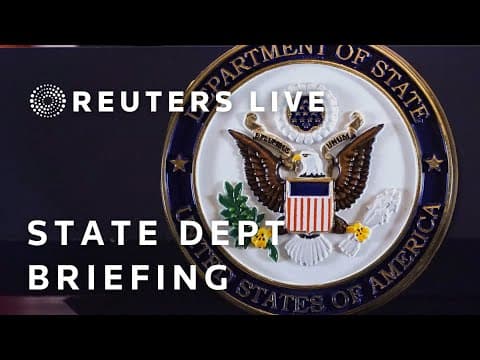LIVE: State Department briefing with Matthew Miller
05 Mar 2024 (almost 2 years ago)

US-Israel Relations
- The US is deeply concerned about the humanitarian crisis in Gaza and is focused on increasing and sustaining aid through various channels.
- The US is exploring the option of establishing a maritime assistance corridor to supplement air and land efforts.
- The US continues to press Israel to allow more aid into Gaza through various crossings, but there is no indication yet that Israel is willing to accept these requests.
- The US is using airdrops as a means to get aid into Gaza due to the urgent need, but it is not a replacement for other mechanisms.
- The US does not currently plan to use military aid as leverage over Israel despite the dire situation in Gaza.
- The US supports Israel's military campaign against Hamas but is concerned about the humanitarian situation in Gaza.
- The US is working to get more humanitarian assistance into Gaza and is engaging with the Israeli government on this issue.
- The US is exploring the possibility of developing a port in Gaza to facilitate the delivery of aid.
- The US is pressuring Israel to allow more trucks carrying aid into Gaza.
- The US believes that Israel could do more to alleviate the humanitarian crisis in Gaza, such as opening more crossings and distributing aid more effectively.
- The US is concerned about the security situation in Northern Gaza and believes that opening a crossing to allow humanitarian aid in would help improve the situation.
- The US is working with Israel and the United Nations to find alternative mechanisms to ensure that aid trucks can safely deliver their supplies.
- The US is in discussions with Israel and other countries that receive US security assistance to ensure compliance with the requirements set forth in the National Security Memorandum, including providing written confirmation that aid will be used in accordance with humanitarian law.
- The US has not been advised of any imminent ground operation in Gaza and expects to be briefed on any such plans before they are carried out.
US-Russia Relations
- Russia's President Putin's rhetoric about nuclear war in response to Western troop deployment in Ukraine is irresponsible and inconsistent with how a nuclear power should discuss such weapons. The US has not changed its nuclear posture and is not sending troops to Ukraine.
- Russia has accused the West of trying to take over Moldova and has threatened Armenia. The US believes this rhetoric is destabilizing to the region and notes that many of Russia's neighbors are concerned about its threatening actions.
- Germany says Russia has ramped up its information war against it. The US does not comment on intelligence matters.
US-Iran Relations
- The IAEA Director General delivered a report to the Board of Governors expressing concerns about Iran's nuclear activities and comments by Iranian officials about their capabilities to build a bomb. The US is coordinating with its allies on an approach to Iran's nuclear program and fully supports the IAEA.
- Iran's Foreign Ministry spokesperson was asked about the 2015 nuclear agreement and said that diplomatic channels were still open. The US has the ability to communicate with Iran when it is in the US interest to do so but will not characterize those communications further.
- The US condemns the four-year prison sentence given to Iranian singer Shervin Hajipour for his protest song "Baraye." The Iranian government's actions are seen as an attempt to crack down on freedom of expression and repress voices within Iranian society.
- The US does not have its own assessment of the voter turnout in Iran's recent election but believes that the Iranian authorities' claims about turnout have generally been unreliable. The US did not assess that the elections would be free and fair, and it is not surprising that many Iranian voters chose not to participate.
US-Pakistan Relations
- The US values its long-standing partnership with Pakistan and views a strong, prosperous, and democratic Pakistan as critical to US-Pakistan interests. The US will continue to focus on advancing shared interests with the new Prime Minister, Shehbaz Sharif.
- The US congratulates Maryam Nawaz on her election as the first woman Chief Minister of Punjab in Pakistan. Her selection is seen as a milestone in Pakistani politics, and the US looks forward to cooperating with Pakistan on integrating women more fully into the country's political life and economy.
US-Afghanistan Relations
- The US believes that the treatment of women and girls in Afghanistan is deplorable and supports the UN's call for countries to initiate a case against the Taliban over women's rights.
- The US remains committed to supporting the people of Afghanistan and is the single largest provider of humanitarian assistance, contributing over $2 billion since August 2021.
US-Zimbabwe Relations
- The US has updated its sanctions policy on Zimbabwe to focus on those currently engaged in human rights abuses and corruption, including President Mnangagwa, while removing sanctions on individuals no longer in government or deceased.
Other
- The US Special Envoy for Yemen, Tim Lenderking, is in Abu Dhabi today. The White House will comment on his travel, as he works for the